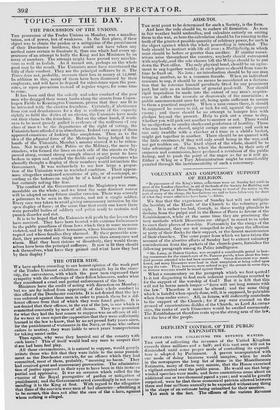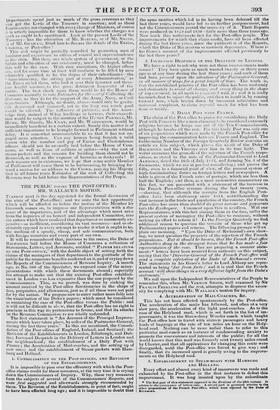DEFICIENT CONTROL OF THE PUBLIC EXPENDITURE.
ESTIMATES FOR COLLECTING THE REVENUE WANTED.
THE cost of collecting the revenues of the United Kingdom exceeds three millions and a half; and this vast sum will not be diminished until some proper mode of controlling its expendi tore is adopted by Parliament. A person unacquainted with our mode of doing business would imagine, when he reads in the newspapers the long list of items in the Miscellaneous Estimates, many of them very minute, that the House exercised a vigilant control over the public purse. He would see that long- winded speeches were made, and fierce contentions arose about an additional one or two thousand mind a year; and would be greatly surprised, were he that these economical patriots allowed between three and four millions annually to be expended without any thing in the shape of an estimate being submitted for their sanction. Yet such is the fact. The officers of the -various Revenue
Departments spend just as much of the gross revenues as they ran get the Lords of the Treasury to sanction; and as these
fanctionaries are changed with every change of Ministers, of course it is utterly impossible for them to know whether the charges a:e such as ought to be sanctioned. Look at the present Lords of the 'Treasury--has the education of Mr. B aR1 NG, or of Mr. or of Mr. GRAHAM, fitted him to discuss the details of the Excise, Customs, or Post-office ?
This etit might be partially remedied by promoting men of business and experience to offices of control and superintendence to the state. But then, our whole system of government, or the habits and education of our aristocracy, must be changed, before this will be the case. With rare exceptions, the higher offices are, and for some time at least will continue to be filled by men admirably qualified to be the dupes of their subordinates—the " bum-buromacy, the sitting part of every Administration," as the Times staled them, who lord it over their ignorant and there- fore fearful toasters, to the great detriment frequently of the public. The best check upon them would be fin. the House of Commons annually to vote Estimates for the c me of Collecting the Revenue, as they do fur the support of the Army, Navy, or Civil departments. Although, no doubt, abuses would only be gradu- ally discovered and removed, yet in the long run touch good would be effected. The influence of publicity, and the know- ledge that, instead of Whig lorillings or lawyers, their.expentli- ture would be subject to the scrutiny of Sir I E Nay PARNELL, Mr. Hume. Mr GROTE, Mr. CLAY, and Mr. WARBURTON, would be immediately beneficial to a certain extent. Surely this matter is of sufficient importance to be brought forward in Parliament without delay. It is somewhat unaccountable to us that it has not en- gaged more attention. Can any human being furnish a valid reason why the number and pay of Excise and Customhouse officers should not be annually laid before the House of Com- mons, as well as those of soldiers or sailors—why the cost of steam-packets and the reasons for building them should not be discussed, as well as the expense of barracks or dockyards? If such reasons are in existence, we lupe that some active Member of Parliament will cause them to be forthcoming, by bringing for- ward a motion for an address to the Crown, praying his Majesty that in all future years Estimates of the cost of Collecting the Revenue may be laid before the Representatives of the People.























 Previous page
Previous page